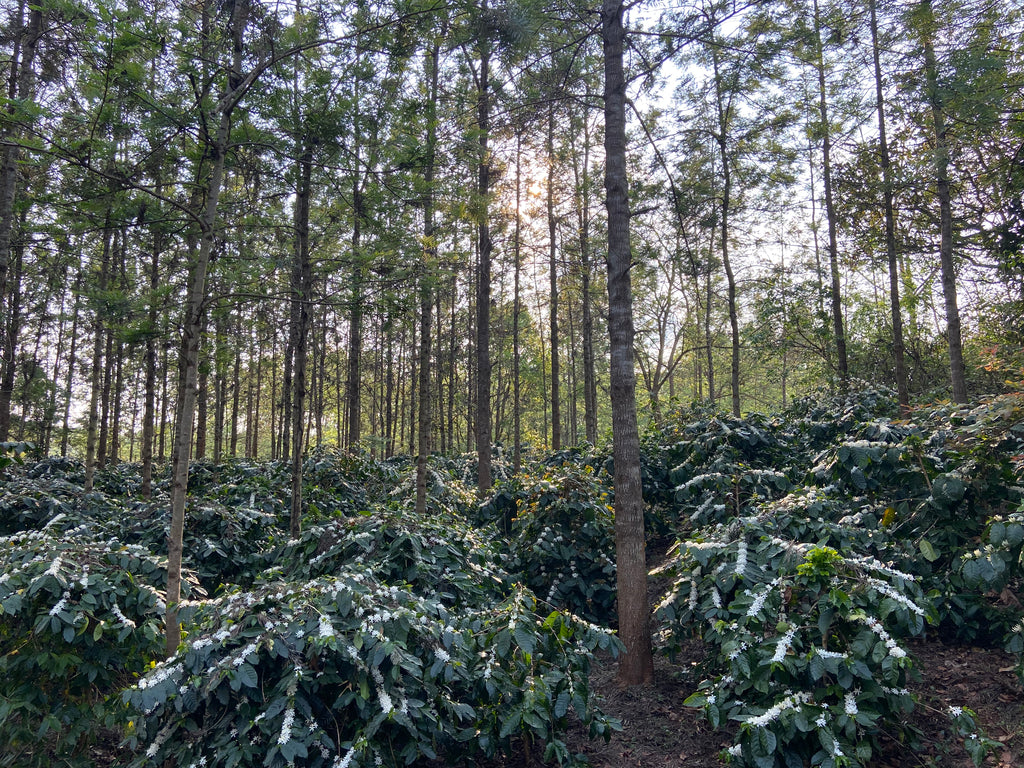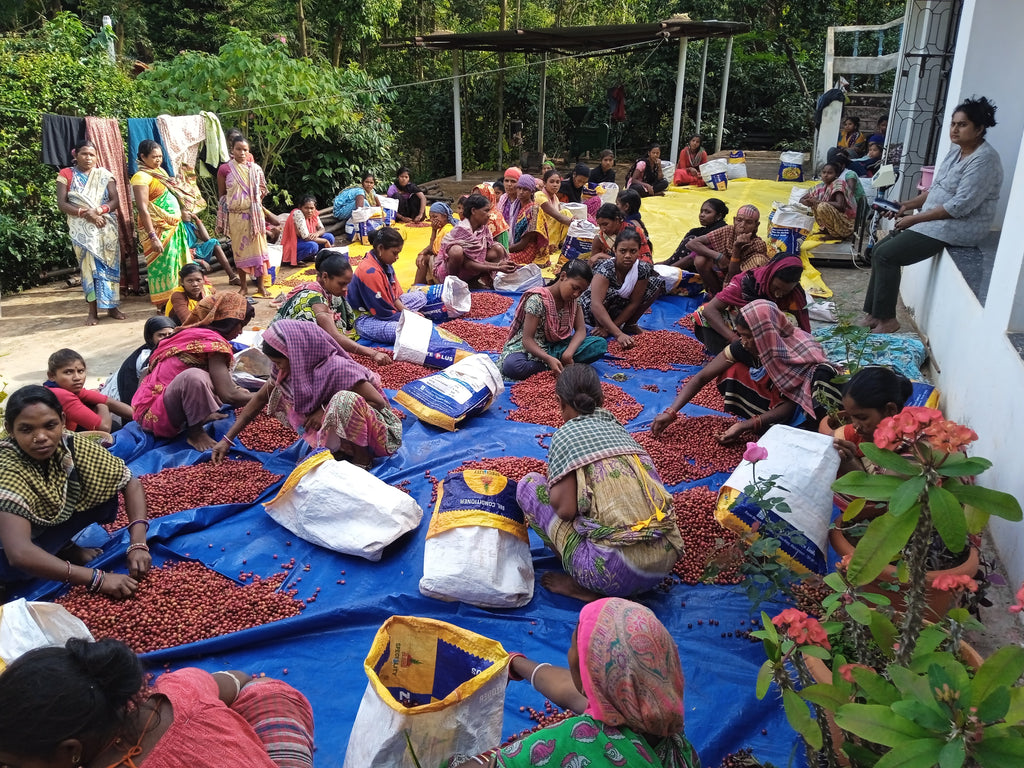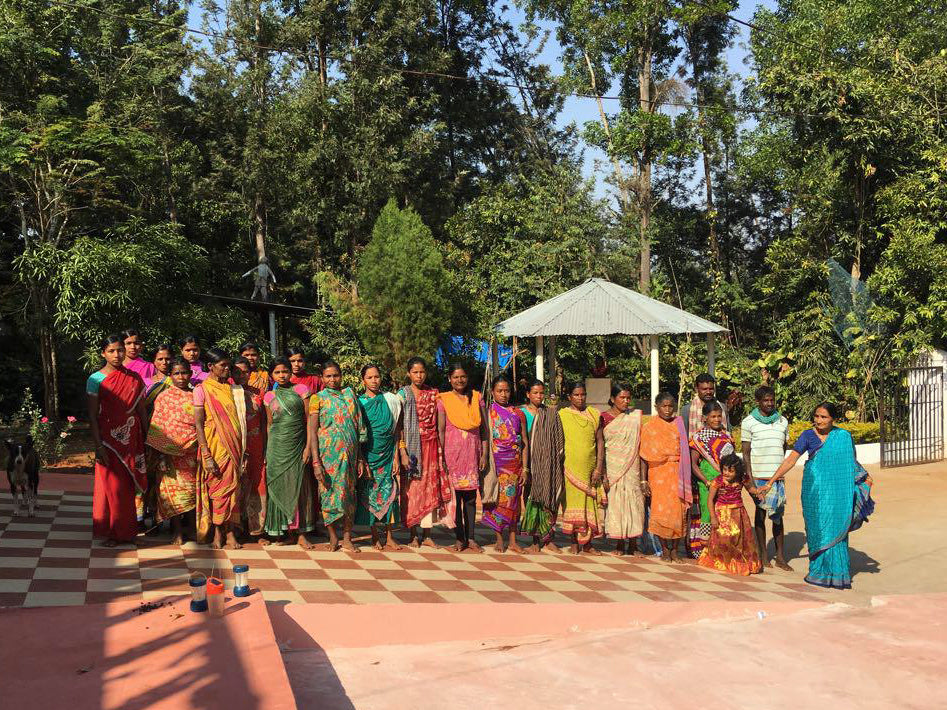In the midst of the hilly terrain of the Eastern Ghats, and the tribal belt of Koraput district, Odisha, lies a fairly young Madhu Agro Plantation growing its signature product Kellar Coffee. The owners, Late Mr. Govinda Reddy and Mrs. T Nirmala Reddy originally intended for this 25 year old plantation to be a post-retirement nature retreat. After Mr. Reddy’s untimely demise, their daughter Rajashree took over the running of the plantation along with her mother. Years of nurturing has resulted in a lush green coffee farm intercropped with a wide variety of fruit trees and spices - mango, lemon, tamarind, jamun, guava, jackfruit, bananas, orange, custard apple, pepper, cinnamon, bay leaf and ginger to name a few. Both Nirmala Reddy and her daughter Rajashree live on the farm unlike many other owners who have managers running the day to day operations on the farm while they live in the nearest city or big town.
While the Madhu Agro Plantation grows both specialty and commodity coffee, their current focus is on their specialty coffees with an emphasis on the all round sustainability of the surroundings. The Reddys have a multi pronged approach to achieving this goal. On the farm, all of their coffee is shade grown and vermicomposting is an integral part of the farming cycle. This helps maintain the integrity of the soil and also keeps it moist without having to use extra water or chemical fertilizers. The farm also has two man made ponds that store rainwater for the summer months.

The non-coffee plants / trees on the estate are mostly native species promoting preservation and biodiversity of the region’s natural habitat. This is especially useful because the Eastern Ghats have been over-mined in the last few years and this has led to deforestation and a threat to the local wildlife. Keeping the farm in its natural condition as far as possible, helps provide a safe haven for some of the wildlife in the area. Monkeys, wild boar, rabbits, snakes and other reptiles, a variety of birds and even the very elusive civet cat now call Madhu Agro Plantation their home. The monkeys however can get destructive during the harvest season as they feed on the coffee berries and spit out the beans which could germinate if not picked up. This often requires extra diligence and labor force.

Pest control methods on the farm are a combination of natural, organic and non-organic methods. Plants like pepper, jackfruit and turmeric are planted alongside the coffee in order to deter pests. Mulch is also used to control weeds and regulate the temperature of the soil. The farm does however need to use a Bodo spray twice a year. This quicklime spray along with a fungicide containing copper is used to control leaf rust. The usage of both these sprays are as per the guidelines of the Coffee Board of India.
A typical work day on the farm looks different for every season, with the busiest time being harvest. Like all crops the coffee plants need maintenance all year round to ensure that the plants remain healthy in order to provide optimum yields. Pest and disease control, thinning of shade trees, de-weeding, mulching, pruning and replanting are all year round activities that are performed on the farm. Madhu Agro plantation proudly empowers women from the surrounding tribal villages as part of its team by providing them with regular work and assisting them with their lives. The plantation adheres to local labor laws, ensures fair wages and is committed to the overall well being of their workers. Like most coffee farms in India, the Reddys also offer their workers medical and financial assistance when needed. Transportation to and from the farm is also provided. Worker morale is also kept up by celebrating festivals by offering lunch and gifts. Group outings are also occasionally planned to neighboring towns.

Kellar Coffee is one of the few coffees in India that is proudly owned and produced by women whose skill and dedication to the farm produces beans of the highest quality. Their mission is to promote the lesser known coffee from Odisha, in India and around the world while creating a truly cohesive ecosystem on the farm and in the surrounding areas. In the future, Madhu Agro Plantations also hopes to receive their TATA C.A.F.E. certification, which will help cement their commitment towards a more sustainable future.
View our current Madhu Agro offerings:
Madhu Agro Honey




